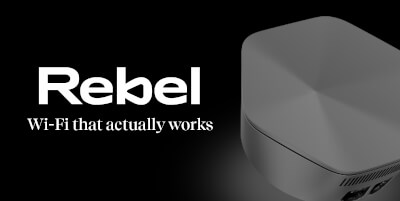Rebel Internet review 2024: Is it any good?
 Dan Howdle • July 17th, 2024
Dan Howdle • July 17th, 2024

Rebel Internet is the new kid in town, offering nationwide broadband coverage via the Openreach network, and positioning itself as a breath of fresh air compared to 'legacy' providers – meaning Sky, Virgin Media, BT and all the others. Promising advanced hardware and 'Wi-Fi that works' it's pretty sour on the offerings of its competitors. But is its confidence justified? Let's take a look.
Key features
Here’s a quick look at what you can expect to find in a Rebel Internet broadband deal:
| Download speeds | 74-1000Mbps |
|---|---|
| Upload speeds | 20-115Mbps |
| Broadband | FTTC, FTTP |
| Home Phone | Optional |
| Packages available | Broadband only |
| Router | Heights HT-178AX Wi-Fi 6 (main), Plume Superpod(s) Wi-Fi 6 (optional extenders) |
| Contract lengths | 1, 12 or 24 months |
| Prices from | £35 per month |
Our review of Rebel Internet
Reasons to buy
- Fast broadband
- Mesh system for total home Wi-Fi
- Flexible contracts
Reasons to avoid
- Expensive
- Whole home Wi-Fi costs extra
- No TV or SIM bundles
Rebel Internet's offering in and of itself is a good one. It's promoting a single, powerful router (the Heights HT-178AX) supplying wifi, with the option to add Plume SuperPods onto your package to cover the corners that are hard to reach. The Plume SuperPod system – a collection of small wifi nodes that spread coverage throughout your home come at a cost, but are about as good as it gets when it comes to mesh wifi. There are similar systems from the likes of BT Complete Wi-Fi, so it's not unique, but the system feels more built with this in mind than many of its competitors.
Another big selling point is Rebel Internet allows you to select the length of your contract. You can choose a one-month rolling contract you can exit anytime, a 12-month, or a 24-month contract. The only penalty for choosing a one-month rolling contract is a £60 one-off up-front fee. Other providers that offer no-contract broadband typically charge a far higher monthly price for the privilege, which across any decent length of time works out way more expensive.
That said, there aren't enough pricing tiers here for our liking. While identical monthly fees on one-month rolling contracts are welcome at that end of the contract length spectrum, they are less so at the other end, with no real benefit to taking out a two-year deal. You'll still pay the same monthly price, and that's not typical. At the time of writing gift vouchers are being given away to new customers, with a higher voucher if you opt for the longer contract, but voucher offers come and go.
-
 £60 voucherFibre Broadband
£60 voucherFibre Broadband- 74Mb average speed +
- Unlimited usage +
- No phone line
- £60 Amazon Voucher
£35.00 per month£60 voucher£0 one-off cost24 month contract -
 £40 voucherFibre Broadband
£40 voucherFibre Broadband- 74Mb average speed +
- Unlimited usage +
- No phone line
- £40 Amazon Voucher
£35.00 per month£40 voucher£0 one-off cost12 month contract -
 £80 voucher1000 Broadband
£80 voucher1000 Broadband- 1Gb average speed +
- Unlimited usage +
- No phone line
- £80 Amazon Voucher
£55.00 per month£80 voucher£0 one-off cost12 month contract
Availability
A definite plus point of Rebel Internet compared to other new providers (which are mostly local altnets) is that it operates on the Openreach network. As such it's available anywhere you can get fibre or Full Fibre broadband. It does not offer ADSL however, so if you're in the 1% or so of homes that can't get basic fibre then you're going to be out of luck.
Full Fibre availability matches that of Openreach of course. That is to say something like 30-40% of UK homes can get it (publicly available data is still quite vague about this). It's a shame it's not more widely available, since its in the very high speeds offered by Rebel Internet's Full Fibre where its offering becomes more compelling.
Broadband speeds
Rebel Internet offers one fibre package and three Full Fibre packages. Note that if you can get fibre, but not Full Fibre, you will only see that package in the comparison or on Rebel's website. If you can get Full Fibre, Rebel will hide the slower fibre deal. They are:
Rebel Fibre: You will only be shown this package if you can't get Full Fibre where you live. However, that's still most of us. Rebel Internet claims an average speed of 74Mbps, but really that's just the top speed regular fibre delivers, and while other providers are compelled to provide the average received by their customers as the headline speed for their packages, Rebel is likely too new to be able to do this. So take that 74Mbps with a pinch of salt for the time being.
Rebel 115: The three remaining packages are all Full Fibre only, so if you don't live in one of the 30-40% of UK homes that can get it, you're out of luck. Rebel 115 delivers, you guessed it, 115Mbps download, and 20Mbps upload. 115Mbps is enough for a medium household with moderate internet usage, but you should probably go for something faster if there are gamers in the household downloading a lot of large files.
Rebel 330: Double the speed of Rebel 115, Rebel 330 offers 330Mbps download and 50Mbps upload. A house with gamers would be well suited here. If you only use your broadband for a bit of streaming and general internet use you probably don't need this much speed.
Rebel 1000: Only the hardcore gaming crowd can really make any good use of the download speeds offered by Rebel 1000. As the name suggests you'll get 1000Mbps download, and 115Mbps upload. Home workers that need to use cloud computing will also benefit from the decent upload speed on offer here.
Not sure which package to pick? Our guide to deciding what broadband speed you need has all the answers.
Upload speeds
Being on the Openreach network is a two-edged sword when it comes to upload speeds. The network, unlike many smaller, unique altnets doesn't offer symmetrical speeds (where the upload speed is the same as the download speed) and so too is it the case with Rebel Internet.
That said, Rebel's upload speeds are decent enough and most users won't notice.
Broadband near you
Cable.co.uk's broadband postcode checker will find you the best deals, providers and speeds where you live. It's free and takes less than a minute to check and compare.
Routers and installation
Rebel Internet supplies two distinct router types. All packages come with the Wi-Fi 6 enabled Height HT-178AX as their main router, though you also have the option of using your own if router if you're the proud owner of a high-spec alternative. If you need extra coverage you can add Plume SuperPods to your network at £5 per month for each additional pod.
It's quite unclear on Rebel's site during the sign-up process how many of the latter you will need since its calculator simply tells you to get one pod for each two rooms in your house. This is an oversimplification, and does not account for the excellent range you'll get from the HT-178AX on its own. We recommend not adding any pods when you sign up, adding them later only once you have a good idea of how distant and numerous your wifi notspots are.
Here is a quick overview of the two routers:
Height HT-178AX specs:
- Wi-Fi 6: Dual-band wireless AX5400
- Wireless bands: 5GHz 4x4 11ax + 2.4GHz 2x2 11ax
- Ports: Four Ethernet ports and 1 USB
- Telephone ports: Two Telephone VoIP ports
- Mesh networking: Integrated EasyMesh R2 controller
- Software: Containerised software based on LXC containers with lifecycle management capabilities
- Multi-access WAN: WAN DSL/35B interface, ETH WAN, and SFP cage (1Giga) for P2P/G.PON connectivity
Plume SuperPod specs:
- Triple band: Simultaneously operating 2.4GHz, 5GHz 2x2 MIMO and 5GHz 4x4 MU-MIMO 802.11b/g/n/ac radios
- Operating bandwidths: 20/40MHz for 2.4GHz radio and 20/40/80MHz for 5GHz radios
- AC3000 Gigabit Wi-Fi: 400 + 867 + 1734 Mbps
- Wi-Fi Channels: 1 to 13, 36 to 48 and DFS channels 52-64, 100 to 112 and 132 to 140
- Security: WPA2-PSK (AES), SPI Firewall and VPN passthrough
- SSID: Single SSID covering all radio bands with custom guest access
- Ports: Two Ethernet ports
- Processor: ARM a7 quad core, 717 MHz
Installation
Installation with Rebel Internet is going to be the same as with any other Openreach provider (BT, Sky, TalkTalk and so on). After you sign up you will be given a date when your service will be activated. It may or may not involve an Openreach engineer visit depending on whether or not you already have an Openreach line coming into your home. This is more likely if you're taking out a Full Fibre deal.
Customer service
Broadband providers with less than 1.5% market share aren't included in Ofcom's annual customer service reporting. However, you can see how it's doing on Trustpilot.
Rebel Internet's 4.7 out of 5.0 speaks of a lot of happy customers, while the handful of negative reviews focus mainly around teething troubles with direct debits and pricing variations Rebel has since fixed.
Our verdict: Excellent
Rebel provides excellent equipment and fast speeds. The ability to easily get a one-month rolling or 12-month contract as alternative options is welcome. Flexibility is good. And Rebel is fast building a towering reputation for customer service. So why 4 stars out of 5?
It simply comes down to the fact that right now its pricing needs some work. £55 per month for a gigabit connection is more expensive even than BT at the time of writing – a provider that has become notoriously expensive itself across the last few years. And ultimately, we struggle to find the £14 per month extra you'll pay in terms of value compared to BT, Sky or Virgin Media.
Priced more aggressively, Rebel Internet would be a great alternative to the ubiquitous big providers. But at this price point, we struggle to fully justify paying more to be one of its customers as things stand.
